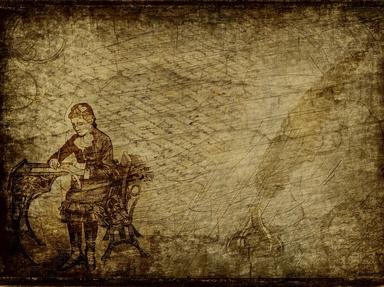Quiz Answer Key and Fun Facts
1. A biographer of Kipling once referred to "The Gods of the Copybook Headings" as a "ferocious post-war eruption." With that in mind, in what year was the poem first published?
2. What were the "copybook headings" referred to in this poem?
3. This poem first appeared in an America periodical three months after its publication in London. In what New York City magazine of literature, culture, politics, and society, which has been in circulation since 1850, was the poem published?
4. "As I pass through my incarnations in every age and race, / I make my proper prostrations to the Gods of ____." What belongs in this blank?
5. Where were we living when the Gods of the Copybook Headings first met us?
6. The Gods of the Copybook Headings "always caught up with our progress, and presently word would come / That a tribe had been wiped off its icefield, or the lights had gone out" where?
7. The Gods of the Copybook Headings, Kipling writes, were "utterly out of touch" with "the Hopes that our World is built on." Which of the following things did the gods NOT deny in Kipling's verse?
8. "When the Cambrian measures were forming, They promised perpetual peace. / They swore, if we gave them our weapons, that the wars of the tribes would cease." To what is Kipling most likely referring in these verses?
9. Kipling writes, "And the Gods of the Copybook Headings said: 'The Wages of Sin is Death.'" To what is this an allusion?
10. "But, though we had plenty of money, there was nothing our money could buy, / And the Gods of the Copybook Headings said: 'If you don't work you die.'" Who originated the expression Kipling more harshly words here as "If you don't work you die."
11. "Then the Gods of the Market tumbled, and their smooth-tongued ____ withdrew." What word is missing from this blank?
12. When the gods of the market tumble, people return to old-fashioned common sense again: "And the hearts of the meanest were humbled and began to believe it was true / That All is not Gold that ___ - and Two and Two make Four." What word is missing from this axiom?
13. "There are only four things certain since Social Progress began: / That the Dog returns to ____ and the Sow returns to her Mire..." What does the dog return to?
14. "And that after this is accomplished, and the brave new world begins..." To whose writings is the phrase "brave new world" a reference?
15. "When all men are paid for existing and no man must pay for his ____." What word completes this line?
Source: Author
skylarb
This quiz was reviewed by FunTrivia editor
looney_tunes before going online.
Any errors found in FunTrivia content are routinely corrected through our feedback system.

